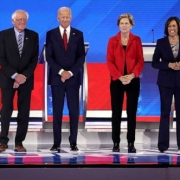A Complex World Needs Simple Rules.
If anyone was wondering who is one of my top living intellectual influences, it would be Richard Epstein. That certainly isn’t a unique assertion given that he is currently one of the most influential legal scholars in the world. Look up any talk he has given on the internet and you will be promptly mesmerized by the sheer intellectual firepower and eloquence that emanates from this man. As a law professor, he has taught about essentially every subject on Earth and I’m sure when human beings eventually colonize the solar system, he would likely be at the forefront of teaching about how we ought to regulate extraterrestrial commerce. But back to the topic of making laws regarding life on Earth. The man has written a great many books but this article will be about one in particular which has a name and subject that is dearly needed for discussion today. His book is called Simple Rules for a Complex World, which sets forth a general framework for an optimal legal and regulatory apparatus for a society as sophisticated as the one we have now. Its core assertion is that a system that maximizes freedom over one that seeks to regulate everything in its path would lead to a far better society.
The Paradox
The idea that we ought to have simple rules for a complex world is one that has been extremely successful in practice but paradoxical in its logic. Why should the rules become more simple and basic as the scope which those rules are intended to regulate grows? When making rules and regulations at the federal level in a country as diverse and complex as America, shouldn’t we have a very sophisticated set of rules? Don’t we need people like Dr. Fauci and the various bureaucrats in the regulatory state to make all sorts of tailored rules for us so society doesn’t collapse in on itself?
This is often the narrative that is espoused today by many politicians and academics but the problem is that we need exactly the opposite. Such burdensome and complicated restrictions on human action made from thousands of miles away is a recipe for incompetence and stagnation. History shows that decision-making rights and coordination are best assigned to those immediately dealing with a problem. The proper role of the state in this system is to simply ensure that rights are respected, interactions are voluntary, and to provide the basic framework for which such mutual interactions can occur with the greatest level of rapidity and ease.
Take, for example, the planning of a wedding. When it comes to the individuals actually involved in the wedding, there will be plenty of precise decisions made about the decorations, the guests, the food, the traditional procedures, and so on. These very precise and complicated rules are made in a concentrated and voluntary manner by those immediately involved. Now, what is the role of government in this equation so that we can have the most amount of successful weddings? Should the Biden administration have an agency dedicated to approving and inspecting every single wedding for compliance with a hypothetical code of wedding conduct? Does it need specialized departments that can deal with weddings from different cultures and conduct detailed analyses on the optimal procedure of weddings?
The answer to this rhetorical question is obviously a resounding no, and it is clear that if that were the case the conduct of weddings in this country will become tremendously more troublesome and perhaps downright dreadful having to deal with such bureaucracy. The only thing the government needs to do is ensure that contractual relationships and individual rights are enforced most likely through a system of courts and police. It should basically be saying that when it comes to holding a wedding my only rule is that as long as nobody tries to hurt anybody or doesn’t try to take anyone’s stuff it’s really none of my business what you do. Such a system can not only accommodate the greatest diversity of wedding arrangements from different cultures and backgrounds, but it also allows for such events to be carried out with the greatest ease.
The problem today of course is that the current trend of the regulatory state follows in the mold of the hypothetical wedding bureau that I just described.
The Power of Freedom of Contract and Reducing Administrative Cost
The basic tools that Epstein lays forward that can solve many administrative issues are honoring freedom of association, private property, contracts, and reducing administrative cost which is typically associated with extensive rulemaking. Take for example the question of environmental regulation and preserving forest land. The current system empowers the state to essentially try to manage forests through a complicated political process. Epstein writes,
“Is cutting timber necessary for the continued vitality of the Pacific Northwest and its lumber industry? The political process leads to grandiose claims of environmental necessity and dire predictions of economic stagnation. The present process of decision making treats the value of the first acre of public land as the same as the value of the last, making it impossible to acquire information to the marginal value of each acre in its alternative uses.”
When it comes to deciding what forests should be used for, the current big-state system essentially encourages extreme political lobbying rather than calculated decision making. How much of the forest should be chopped down to fuel essential progress and what portion needs to be preserved to protect nature? The current system of public regulation only encourages zealots from both sides rather than real cost-benefit analysis.
Now let’s say we simply allowed private associations such as lumber yards, landowners, nature preserves, and so on to voluntarily figure this out on their own via a system of market processes. Epstein writes,
“Private owners have incentives to harvest that timber which is easy to replace and can be removed with little damage to other parts of their property. But the companies who harvest public lands care little about the replacement value of the timber they cut. Worse still, since they do not own the land outright, they care little about the damage that their cutting does to the forest itself. The same companies that harvest their own lands with an eye toward recreational use will take far less care in harvesting on public lands because they collect none of the gains of good husbandry and all of the gains from quick cutting.”
The current system of public forest management is a classic example of the tragedy of the commons, which is when in the absence of discreet property rights everyone just abuses the land. If companies operated in a system of simple contracts and private property rather than the current public management system, the incentives of such an arrangement would actually lead them to be more careful with the environment. Such care for the environment would paradoxically be linked to the pursuit of profit as companies can typically make more money with sustainable practices and preserving parts of the forest for tourism and so on. It’s also far cheaper for taxpayers as they won’t be on the hook for some broad regulatory apparatus. Such a system of private management has the potential for more dynamic and effective use of forests as compared to the current political process.
Another important area where a simple system of contracts and private association would be beneficial is labor relations. The current system has a sprawling litany of rules regarding things like minimum wage, healthcare requirements, promotions, dismissals, and so on. Now, this isn’t to say that unions and the demands that they advocate for shouldn’t exist, but they certainly shouldn’t be federal law. The current system not only makes operating a business extremely complicated, which hurts both management and labor, but it also favors established large businesses that can afford to comply with all the regulations. Small businesses and other forms of corporations that don’t fit the traditional mold of big businesses which can afford to comply are disadvantaged by these rules. Ironically, these anti-capitalist regulations primarily benefit established corporations, which is why the Marxist Jacobin magazine even published an article talking about how small businesses are overrated because they can’t provide the same labor benefits as the larger ones.
A superior system to the current sprawling expanse of labor regulations is to simply enforce contracts made by employees with employers. Allow individual workers and companies to create these arrangements for wages, healthcare, job security, and other requirements on their own. Allow labor unions to engage in back and forth discussions with management, so that provided violence is not used, the government need not care about the results. Every company has individual needs and preferences which are then balanced against the needs of its workers. In a competitive and open market, employees who do not feel accommodated may leave for other companies which in turn creates incentives to treat workers better. The current dominance of the administrative state in policing labor relations not only stunts innovation but holds the entire country captive to the interests of politically-connected big corporations and big labor.
Key Takeaways
Epstein’s book is one where every chapter could become an article in itself. There is so much I wish I could touch on here, like how a simple system of contracts and freedom of association can do far better in accomplishing monopoly regulation than current antitrust laws. Then there are his interesting views and masterful illustrations of the evolution of modern product liability standards, corporate structuring, tort law, and so on. The main takeaway from this book is that there is massive potential to improve society, if we move away from the current manner in which we view regulation to a system that prioritizes individual autonomy. The current system essentially follows Maslow’s hammer to which if all you have is a hammer, everything looks like a nail. Our current bias towards trying to make a government rule for every single issue that arises in society is not only ignorant of the very institutions of freedom that make our society prosper, but it also threatens to continue a vicious cycle that fuels an ever-encroaching state. A more optimal solution to address societal issues would be a paradigm shift to a system that understands the power and promise of simple rules in an ever more complex world.













